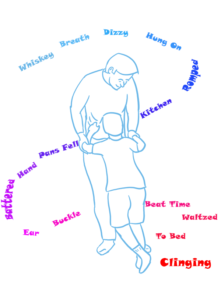My Papa’s Waltz by Theodore Roethke
The whiskey on your breath
Could make a small boy dizzy;
But I hung on like death:
Such waltzing was not easy.
We romped until the pans
Slid from the kitchen shelf;
My mother’s countenance
Could not unfrown itself.
The hand that held my wrist
Was battered on one knuckle;
At every step you missed
My right ear scraped a buckle.
You beat time on my head
With a palm caked hard by dirt,
Then waltzed me off to bed
Still clinging to your shirt.
 What I like about poetry is that it often encourages, even rewards, you for bringing your own baggage to the reading. As such, perhaps I’m overly effected by the loss of both of my Dads to cancer, but I look at this poem and see joy in spite of the pressures of life. I see a father having a bad day on the job. One in an endless string of bad days which led him to the bar with his buddies. He’s over-indulged, no question. His knuckles a sign that this is not his usual behavior. A professional drunk would know how not to fall down.
What I like about poetry is that it often encourages, even rewards, you for bringing your own baggage to the reading. As such, perhaps I’m overly effected by the loss of both of my Dads to cancer, but I look at this poem and see joy in spite of the pressures of life. I see a father having a bad day on the job. One in an endless string of bad days which led him to the bar with his buddies. He’s over-indulged, no question. His knuckles a sign that this is not his usual behavior. A professional drunk would know how not to fall down.
He gets home, and his wife is not amused. This behavior is out of the norm for him, and she can’t hold in her frown, but the father doesn’t mind because he is home. He is with the ones he loves, and that melts the day’s toils away. His son has waited up to see him. Rushes to his arms, grabs tight, and they dance as only a parent and child can… a rough hug becoming a raucous dance with the boy standing on his fathers shoes as they wreak havoc rocking across the kitchen, the house, and eventually, the boys room. He doesn’t want to let go, but sleep will come soon enough, his mind at ease because Daddy is home.
Now, let’s consider the above video. The words in a poem create a scaffold on which we hang our interpretations. From those interpretations, we infer emotion and complete a scene. In the video, the scene plays out before us, fully explicated. We can see the joy of the daughter dancing with the father, hear the laughter of the wife (?) working the camera, and the openness of the father, free to be the clown, when surrounded by family and/or friends.
It’s an interesting difference in that the words of the poem ask you to complete the scene whereas the video asks you to consider the backgrounds of the actors in the scene playing out before you. Who are these people? Is the father a bit of a jackass or just letting loose with the family on a day off?
The poem and the video play out different and yet thematically similar scenes. I can easily imagine the Dad in the video being the beaten down Dad from the poem. As it happens, my reading of the poem is well-aligned with the Dad in the video. Be it a good day or a bad day, his joy is to be with his family and dance.
If I had taken a darker view of the poem, there is certainly meat there to paint a scene of alcoholism and/or abuse, I wonder how the juxtaposition of the two scenes would play out? Would the (presumably) sober actions of the father lesson the dark impact of the drunken scoundrel. Viewed separately, they would form very different pictures of a domestic situation, but viewed together, they present a complex image of a troubled man. Does the happiness shown by the daughter and the wife ameliorate the written wife’s anger or the boy’s potentially fear-tinged joy at a raucous moment shared with his Dad? In my initial take on the poem and the video, they support each other and leave the reader/viewer satisfied. If the darker reading is considered, the two together lead to more questions.